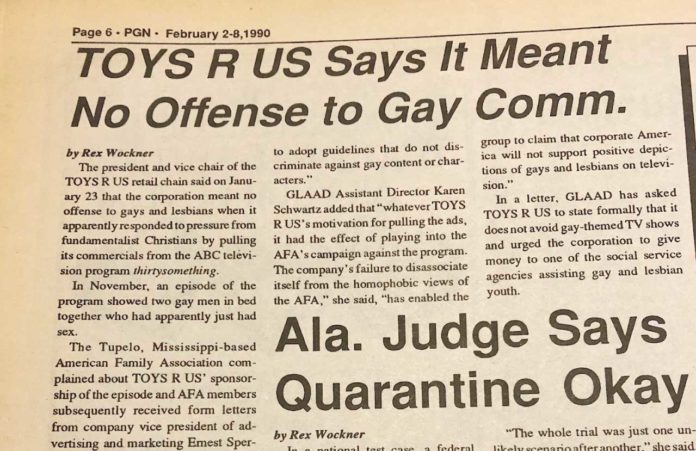Thirty years ago, PGN published an article by Rex Wockner about a controversy surrounding popular toy store chain TOYS “R” US. The company had recently yanked its commercial advertising from the ABC television sitcom “Thirtysomething.” The show, which followed a group of Philadelphia baby boomers in the 1980s, had recently broadcast an episode with a scene of two men lying in bed together. While the men were not shown touching or kissing, it was implied that they had recently had sex.
Following the broadcast of the episode (titled “Strangers”) in November 1989, the American Family Association, known for its homophobic and anti-abortion platforms, complained to TOYS “R” US about the company’s advertisements on the episode. AFA members received a form letter in response that stated TOYS “R” US was “very disappointed with the content of the episode” and would be cancelling all its remaining commercials on the program. The company also vowed to review its other TV sponsorships to ensure compliance with “our strict guidelines and standards.”
TOYS “R” US President Robert Nakasone further commented that the company found the episode in poor taste but did not have anything against gay and lesbian people. He stated that the company had previously pulled commercials from heterosexual programs for their content.
The Gay and Lesbian Alliance Against Defamation (GLAAD) called out Nakasone for “doublespeak jibberish” stating that the company had continued to advertise on Thirtysomething even when the hetereosexual characters were featured in more sexually explicit scenes compared to the gay characters.
“It is obviously a homophobic pulling of ads,” GLAAD spokesperson Steve Miller said, “and we intend to pressure all such advertisers to adopt guidelines that do not discriminate against gay content or characters.” GLAAD followed up by sending a letter to TOYS “R” US asking the company to state that it does not avoid gay-themed TV shows and to donate to gay and lesbian social service agencies.
While “Thirtysomething” was cancelled two years later, the “Strangers” episode was a milestone in LGBTQ representation on television, and the show has been lauded for its depiction of a gay man during the AIDS epidemic. ABC, which is owned by Disney, continued to make LGBTQ television history with shows including “My So Called Life,” “All My Children,” and “Ellen,” with the latter suffering a similar fate when advertisers pulled out following the iconic “coming out” episode.
Recently, Disney again made advertising headlines when the company pulled its commercials from Fox News Channel’s “Tucker Carlson Tonight” over the host’s views on George Floyd’s murder and the Black Lives Matter movement. Carlson told his audience, among other things, that: “This may be a lot of things, this moment we are living through, but it is definitely not about black lives and remember that when they come for you, and at this rate, they will.” T-Mobile also pulled its advertisements from the program.
LGBTQ representation on television has steadily increased since the ‘80s and ‘90s, and more and more advertisers are willing to sponsor shows with queer themes and characters. But moreover, advertisers, as evidenced by Disney’s departure from Tucker Carlson Tonight, are also willing to leave programs that promote racism and anti-inclusion. We can only hope that the next time a scripted show or news program is homophobic, its advertisers think twice about showing their support. Visibility, in television and everywhere else, always matters.
